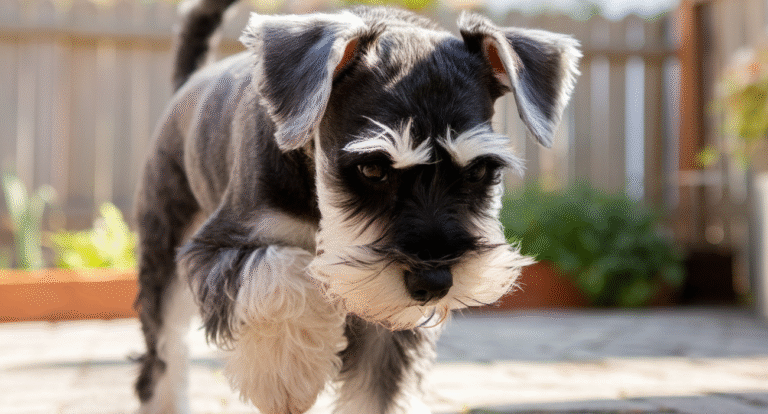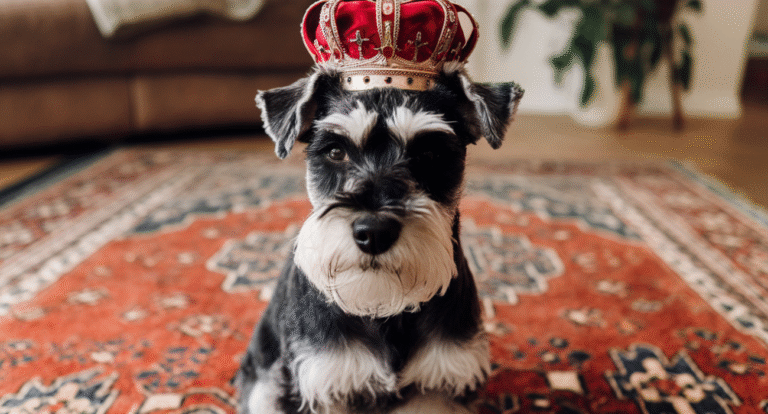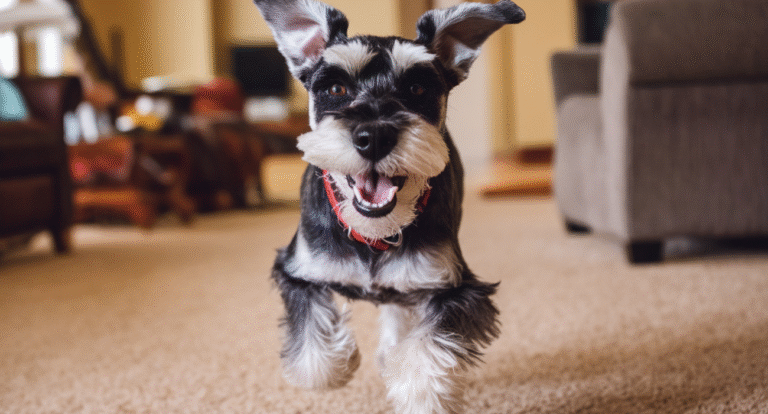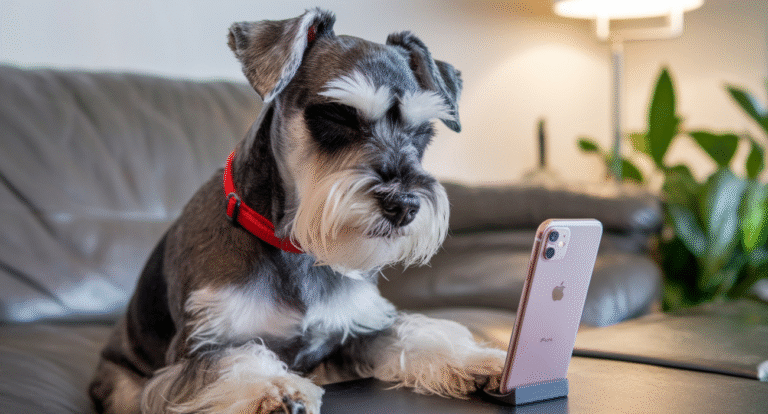Miniature Schnauzers are energetic, intelligent, and playful dogs that require regular exercise to maintain their physical and mental well-being. As a responsible pet owner, it’s crucial to recognize the signs that your furry friend may not be getting enough physical activity.
This article will explore ten key indicators that your Miniature Schnauzer needs more exercise, along with explanations of why these behaviors occur and how increased physical activity can help address them.
By understanding these signs, you can ensure your Miniature Schnauzer leads a healthy, happy, and balanced life.
1. Increased Barking and Whining
If your Miniature Schnauzer is barking and whining excessively, it could be a sign that they are not getting enough physical and mental stimulation. Dogs that are bored or have pent-up energy often express themselves through vocalizations.
This behavior can be particularly frustrating for both the dog and their owners, as it may lead to tension in the household and even complaints from neighbors.
Providing regular exercise can help reduce this behavior significantly. When Miniature Schnauzers engage in physical activities, they burn off excess energy and stimulate their minds, which can lead to a calmer and more content demeanor.
Activities such as daily walks, play sessions, or obedience training can help channel their energy into positive outlets, reducing the likelihood of excessive barking and whining.
2. Destructive Behavior
Miniature Schnauzers that are not getting enough exercise may resort to destructive behavior such as chewing furniture, digging, or destroying toys. This is because they are trying to release their pent-up energy and engage their minds.
These behaviors are not only frustrating for owners but can also be dangerous for the dog if they ingest harmful materials or damage their teeth.
Regular exercise can help channel their energy into more positive activities. By providing your Miniature Schnauzer with appropriate physical and mental stimulation, you can reduce their urge to engage in destructive behaviors.
Consider incorporating activities that challenge both their body and mind, such as puzzle toys, agility training, or interactive games. These activities can help satisfy their natural instincts and keep them occupied in a constructive manner.
3. Weight Gain
Miniature Schnauzers that are not getting enough exercise are more likely to gain weight. This can lead to a range of health problems, including obesity, diabetes, and joint issues. Excess weight puts additional strain on their bodies, potentially leading to decreased mobility, reduced quality of life, and shortened lifespan.
Regular exercise helps maintain a healthy weight and overall well-being. By engaging in physical activities, Miniature Schnauzers can burn calories, build muscle, and improve their metabolism. This not only helps prevent weight gain but also contributes to better cardiovascular health, stronger bones, and improved digestion.
Consult with your veterinarian to determine the appropriate exercise regimen and diet for your Miniature Schnauzer to ensure they maintain a healthy weight.
4. Lethargy
If your Miniature Schnauzer seems lethargic or uninterested in activities they once enjoyed, it could be a sign that they are not getting enough exercise. This lack of enthusiasm may be mistaken for laziness or aging, but it’s often a result of insufficient physical activity. A sedentary lifestyle can lead to decreased energy levels and a reduced interest in play or interaction.
Regular physical activity helps maintain their natural energy levels and enthusiasm. By engaging in consistent exercise routines, Miniature Schnauzers can improve their overall fitness, leading to increased stamina and vitality.
This renewed energy often translates into a more active and engaged pet, eager to participate in family activities and playtime. Remember to start slowly and gradually increase the intensity and duration of exercise, especially if your dog has been inactive for a while.
5. Pacing or Restlessness
Miniature Schnauzers that are not getting enough exercise may exhibit pacing or restlessness, especially in the evening. This is because they have excess energy that needs to be released. You might notice your dog walking back and forth, unable to settle down, or constantly seeking attention. This behavior can be disruptive to both the dog and the household.
Providing regular exercise can help them relax and settle down. By engaging in physical activities throughout the day, Miniature Schnauzers can expend their energy in a healthy way. This often results in a calmer and more relaxed dog in the evening hours.
Consider incorporating a consistent exercise routine that includes activities like walks, fetch, or agility training. This can help your dog maintain a more balanced energy level throughout the day and promote better rest at night.
6. Digging or Escaping
Dogs that are not getting enough exercise may try to escape or dig their way out of the yard. This is often a sign that they are seeking adventure and physical activity. Miniature Schnauzers, with their terrier heritage, have a natural instinct to dig and explore. When these instincts are not satisfied through appropriate outlets, they may resort to destructive or dangerous behaviors.
Regular exercise can help reduce this behavior by providing the physical and mental stimulation they crave. By offering structured activities and opportunities for exploration, you can satisfy your Miniature Schnauzer’s natural curiosity and energy needs.
Consider incorporating activities that mimic their instinctual behaviors, such as digging in a designated sandbox or participating in scent work. These activities can help redirect their energy and reduce the likelihood of escape attempts or unwanted digging.
7. Over-Dependence on Treats
Miniature Schnauzers that are not getting enough exercise may become overly dependent on treats for stimulation. This can lead to weight gain and other health problems. When dogs lack physical activity, they may seek other forms of gratification, often turning to food as a source of comfort or excitement. This behavior can create a cycle of unhealthy eating habits and further reduced activity.
Regular exercise provides a healthier outlet for their energy and can help reduce the reliance on treats. Physical activity naturally releases endorphins, which can provide a sense of satisfaction and well-being for your dog.
By incorporating regular exercise into your Miniature Schnauzer’s routine, you can help them find joy and stimulation in activities other than eating. This can lead to a more balanced approach to treats and food, improving their overall health and reducing the risk of obesity-related issues.
8. Lack of Socialization
Miniature Schnauzers that are not getting enough exercise may not be socialized properly, leading to fear or aggression towards other dogs or people. Regular exercise often provides opportunities for dogs to interact with their environment and other beings, which is crucial for their social development. Without these experiences, they may become anxious or reactive in new situations.
Regular exercise provides opportunities for socialization and helps build confidence. Activities such as walks in the park, visits to dog-friendly areas, or participation in obedience classes can expose your Miniature Schnauzer to various sights, sounds, and social interactions.
These experiences help them develop better social skills and adaptability. As they become more comfortable in different environments and around other dogs and people, their overall behavior and confidence are likely to improve.
9. Hyperactivity in Short Bursts
Miniature Schnauzers that are not getting enough exercise may exhibit hyperactivity in short bursts, such as sudden outbursts of energy or playfulness. This is because they are releasing pent-up energy that has accumulated due to lack of regular physical activity. These bursts of hyperactivity can be challenging to manage and may occur at inconvenient times, such as when you’re trying to relax or have guests over.
Regular exercise can help distribute their energy more evenly throughout the day. By providing consistent opportunities for physical activity, you can help your Miniature Schnauzer maintain a more balanced energy level.
This often results in a calmer, more composed dog that is less likely to exhibit sudden bursts of hyperactivity. Incorporate a mix of activities that challenge them both physically and mentally, such as agility training, fetch, or puzzle toys, to help them expend energy in a controlled and productive manner.
10. Chewing or Licking
Miniature Schnauzers that are not getting enough exercise may exhibit excessive chewing or licking behaviors. This is often a sign of boredom or anxiety, which can be alleviated with regular exercise.
When dogs don’t have appropriate outlets for their energy and mental stimulation, they may turn to repetitive behaviors like chewing on objects or excessive licking of their paws or other body parts.
Regular exercise can help reduce these behaviors by providing both physical and mental stimulation. Physical activities help burn off excess energy, while mental challenges keep their minds engaged. Consider incorporating activities that combine both elements, such as obstacle courses or scent work games.
These can help satisfy your Miniature Schnauzer’s need for stimulation and reduce the likelihood of developing destructive chewing habits or obsessive licking behaviors. Additionally, regular exercise can help reduce anxiety and promote overall relaxation, further decreasing the likelihood of these unwanted behaviors.






